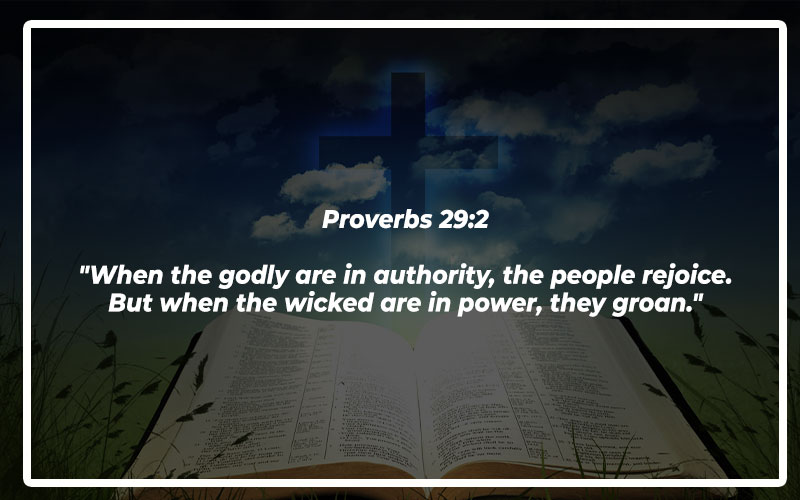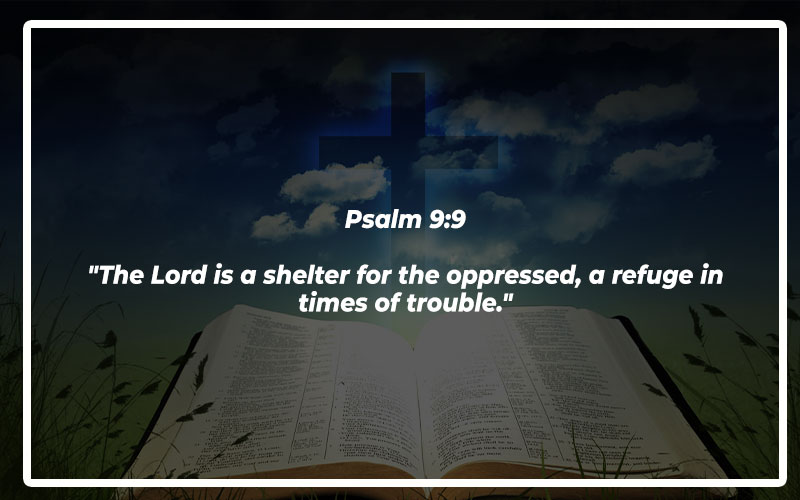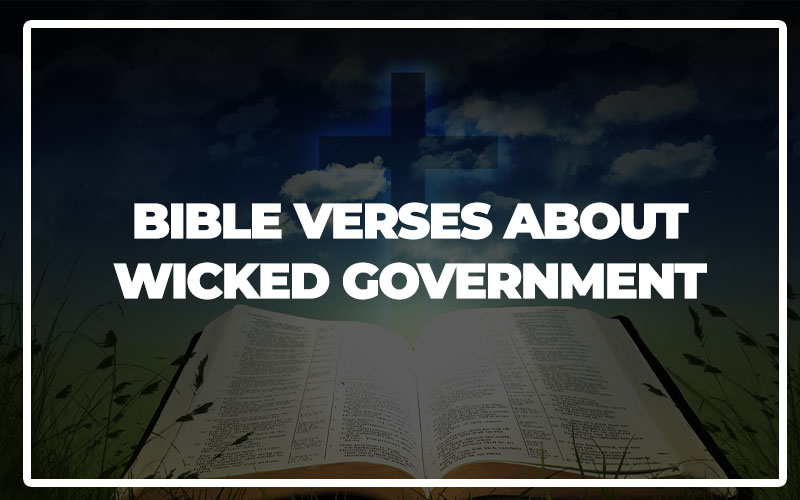The Bible has numerous references to corrupt leadership and the consequences of wicked governance. Understanding these scriptures helps us recognize the importance of righteous leadership and the impact of evil rulers on society. Here are some key Bible verses that address wicked government and provide insights on how to navigate through such times.
Also Read: Bible Verses About Politics
The Nature of Wicked Leaders
Wicked leaders are often characterized by their deceitful, unjust, and oppressive actions. The Bible highlights the nature of these leaders, showing us their motives and the damage they cause to those they govern.
Proverbs 29:2
“When the godly are in authority, the people rejoice. But when the wicked are in power, they groan.”

This verse clearly illustrates the stark difference in the well-being of people under godly versus wicked leadership. Righteous leaders bring joy and prosperity, while evil rulers cause suffering and distress.
Isaiah 10:1-2
“What sorrow awaits the unjust judges and those who issue unfair laws. They deprive the poor of justice and deny the rights of the needy among my people. They prey on widows and take advantage of orphans.”
These verses condemn leaders who exploit their power to create unjust laws that oppress the vulnerable. Such actions invite divine judgment and highlight the moral responsibility of those in authority.
Psalm 94:20
“Can unjust leaders claim that God is on their side—leaders whose decrees permit injustice?”
The psalmist questions the legitimacy of wicked leaders who claim divine support while promoting injustice. This verse reminds us that true leadership aligns with God’s principles of justice and righteousness.
Micah 3:1-3
“I said, ‘Listen, you leaders of Israel! You are supposed to know right from wrong, but you are the very ones who hate good and love evil. You skin my people alive and tear the flesh from their bones.'”
Micah denounces leaders who pervert justice and exploit the people they are supposed to protect. This graphic imagery emphasizes the severity of their wrongdoing and the betrayal of their sacred duty.
Ezekiel 34:2-4
“Son of man, prophesy against the shepherds, the leaders of Israel. Give them this message from the Sovereign Lord: ‘What sorrow awaits you shepherds who feed yourselves instead of your flocks. Shouldn’t shepherds feed their sheep?'”
These verses liken wicked leaders to negligent shepherds who prioritize their own needs over those of their flock. God’s rebuke underscores the expectation that leaders should care for and serve their people.
Consequences of Wicked Governance
The Bible often warns about the dire consequences that befall a nation under wicked leadership. These scriptures highlight the resulting chaos, suffering, and divine judgment that come from corrupt governance.
Proverbs 28:15
“A wicked ruler is as dangerous to the poor as a roaring lion or an attacking bear.”
This verse uses vivid imagery to convey the threat that wicked rulers pose to the most vulnerable members of society. Their leadership results in fear, harm, and exploitation of the poor.
Isaiah 3:12
“Childish leaders oppress my people, and women rule over them. O my people, your leaders mislead you; they send you down the wrong road.”
Isaiah highlights the chaos and misdirection that result from ineffective and misguided leadership. The lack of wise and mature governance leads to national distress and waywardness.
Jeremiah 23:1-2
“What sorrow awaits the leaders who destroy and scatter the sheep of my pasture! Therefore, this is what the Lord, the God of Israel, says to these shepherds: ‘Instead of caring for my flock and leading them to safety, you have deserted them and driven them to destruction.'”
God’s judgment on corrupt leaders is severe, as they are held accountable for the suffering and dispersion of their people. This passage underscores the divine expectation for leaders to nurture and protect their flock.
Hosea 4:6
“My people are being destroyed because they don’t know me. Since you priests refuse to know me, I refuse to recognize you as my priests. Since you have forgotten the laws of your God, I will forget to bless your children.”
Hosea connects the destruction of the people with the failure of their leaders to uphold and teach God’s laws. The neglect of spiritual and moral guidance by leaders results in widespread ruin.
Amos 5:10-12
“How you hate honest judges! How you despise people who tell the truth! You trample the poor, stealing their grain through taxes and unfair rent. Therefore, though you build beautiful stone houses, you will never live in them.”
Amos condemns leaders who oppress the poor and despise justice, warning them of the inevitable consequences of their actions. Their ill-gotten gains will ultimately be of no benefit to them.
God’s Response to Wicked Governments
God does not remain silent in the face of wicked governance. The Bible reveals how God intervenes to judge and dismantle corrupt leadership, ensuring justice and righteousness prevail.
Psalm 75:7
“It is God alone who judges; he decides who will rise and who will fall.”
This verse affirms God’s sovereignty in raising and deposing leaders. It reassures believers that no wicked ruler can maintain power indefinitely, as God’s justice will ultimately prevail.
Daniel 2:21
“He controls the course of world events; he removes kings and sets up other kings. He gives wisdom to the wise and knowledge to the scholars.”
Daniel emphasizes God’s control over world events, including the rise and fall of rulers. This verse encourages believers to trust in God’s overarching plan and wisdom in governance.
Isaiah 33:22
“For the Lord is our judge, our lawgiver, and our king. He will care for us and save us.”
This verse highlights God’s multifaceted role as judge, lawgiver, and king. His ultimate authority and care for His people provide assurance and hope amid corrupt earthly leadership.
Revelation 19:15-16
“From his mouth came a sharp sword to strike down the nations. He will rule them with an iron rod. He will release the fierce wrath of God, the Almighty, like juice flowing from a winepress.”
Revelation portrays Christ as the ultimate conqueror who will judge and rule the nations. This imagery assures believers of God’s decisive action against wickedness and the establishment of His righteous reign.
Jeremiah 1:10
“Today I appoint you to stand up against nations and kingdoms. Some you must uproot and tear down, destroy and overthrow. Others you must build up and plant.”
God’s commission to Jeremiah reflects His power to dismantle corrupt governments and establish righteous ones. This verse underscores the prophetic role in confronting and transforming leadership.
Also Read: Bible Verses About Patriotism
The Role of Believers Under Wicked Government
Believers are called to navigate through times of corrupt governance with wisdom and integrity. The Bible provides guidance on how to respond to unjust leaders while maintaining faithfulness to God’s principles.
Romans 13:1-2
“Everyone must submit to governing authorities. For all authority comes from God, and those in positions of authority have been placed there by God. So anyone who rebels against authority is rebelling against what God has instituted, and they will be punished.”
Paul urges believers to respect and submit to authorities, recognizing their position as part of God’s divine order. This verse calls for a balance of obedience and discernment in dealing with wicked leaders.
1 Peter 2:13-14
“For the Lord’s sake, submit to all human authority—whether the king as head of state, or the officials he has appointed. For the king has sent them to punish those who do wrong and to honor those who do right.”
Peter advises submission to human authority for the sake of the Lord. This passage highlights the purpose of government to maintain justice and order, even under less-than-ideal leadership.
Titus 3:1-2
“Remind the believers to submit to the government and its officers. They should be obedient, always ready to do what is good. They must not slander anyone and must avoid quarreling. Instead, they should be gentle and show true humility to everyone.”
Paul’s counsel to Titus emphasizes the importance of humility, obedience, and good conduct among believers, even in challenging political climates. This approach reflects Christ-like character.
Matthew 5:44
“But I say, love your enemies! Pray for those who persecute you!”
Jesus’ command to love and pray for our enemies includes those in power who may oppress us. This radical love demonstrates the transformative power of God’s kingdom and challenges the cycle of hatred and revenge.
Acts 5:29
“But Peter and the apostles replied, ‘We must obey God rather than any human authority.'”
When faced with conflicting demands, believers must prioritize obedience to God. Peter’s bold declaration highlights the necessity of unwavering faithfulness to God’s commands over human authority.
Praying for Leaders
The Bible encourages believers to pray for those in authority, including wicked leaders. Through prayer, we seek God’s intervention, wisdom, and transformation in governance.
1 Timothy 2:1-2
“I urge you, first of all, to pray for all people. Ask God to help them; intercede on their behalf, and give thanks for them. Pray this way for kings and all who are in authority so that we can live peaceful and quiet lives marked by godliness and dignity.”
Paul’s exhortation to pray for all leaders underscores the importance of seeking God’s guidance and peace in governance. Prayer for leaders is an essential aspect of fostering a just and peaceful society.
Jeremiah 29:7
“And work for the peace and prosperity of the city where I sent you into exile. Pray to the Lord for it, for its welfare will determine your welfare.”
Jeremiah’s instruction to the exiles emphasizes the interconnectedness of a city’s welfare and the well-being of its inhabitants. Praying for the peace and prosperity of our communities is a vital responsibility of believers.
Proverbs 21:1
“The king’s heart is like a stream of water directed by the Lord; he guides it wherever he pleases.”
This verse reassures believers that God can influence the hearts of leaders. Praying for divine guidance in leadership aligns with trusting God’s sovereign control over rulers.
Psalm 72:1
“Give your love of justice to the king, O God, and righteousness to the king’s son.”
The psalmist’s prayer for a just and righteous king reflects the desire for godly leadership. This verse encourages us to seek God’s intervention in bestowing wisdom and justice upon those in power.
Ezra 6:10
“Then they will be able to offer acceptable sacrifices to the God of heaven and pray for the welfare of the king and his sons.”
Ezra highlights the practice of praying for the king’s welfare as part of religious duty. This verse illustrates the integration of spiritual practices with civic responsibility, emphasizing the importance of intercession for leaders.
Hope for the Oppressed
In times of wicked governance, the Bible offers hope and assurance to the oppressed. These scriptures provide comfort and the promise of God’s justice and deliverance.
Psalm 9:9
“The Lord is a shelter for the oppressed, a refuge in times of trouble.”

This verse portrays God as a protective refuge for those suffering under oppressive rule. It assures believers of His constant presence and support during difficult times.
Isaiah 41:10
“Don’t be afraid, for I am with you. Don’t be discouraged, for I am your God. I will strengthen you and help you. I will hold you up with my victorious right hand.”
God’s promise of strength and support to His people provides encouragement amid oppression. This verse calls for trust in God’s unwavering presence and power to uphold the faithful.
Matthew 5:10
“God blesses those who are persecuted for doing right, for the Kingdom of Heaven is theirs.”
Jesus’ blessing on the persecuted offers hope and assurance of heavenly reward for those who endure suffering for righteousness. This verse highlights the eternal perspective of God’s justice.
Romans 8:35-37
“Can anything ever separate us from Christ’s love? Does it mean he no longer loves us if we have trouble or calamity, or are persecuted, or hungry, or destitute, or in danger, or threatened with death? No, despite all these things, overwhelming victory is ours through Christ, who loved us.”
Paul’s declaration of Christ’s inseparable love reassures believers of their victory over all forms of oppression. This verse emphasizes the triumph and security found in Christ’s love.
2 Corinthians 4:8-9
“We are pressed on every side by troubles, but we are not crushed. We are perplexed, but not driven to despair. We are hunted down, but never abandoned by God. We get knocked down, but we are not destroyed.”
Paul’s words highlight the resilience and perseverance of believers through God’s sustaining power. This verse offers encouragement to remain steadfast despite the challenges posed by wicked governance.
The Ultimate Triumph of God’s Kingdom
The Bible prophesies the ultimate defeat of wicked governments and the establishment of God’s righteous kingdom. These verses reveal the hope and assurance of God’s eternal reign.
Daniel 7:14
“He was given authority, honor, and sovereignty over all the nations of the world, so that people of every race and nation and language would obey him. His rule is eternal—it will never end. His kingdom will never be destroyed.”
Daniel’s vision of the eternal kingdom underscores the ultimate authority of God’s reign over all nations. This verse assures believers of the everlasting justice and peace of God’s kingdom.
Revelation 11:15
“Then the seventh angel blew his trumpet, and there were loud voices shouting in heaven: ‘The world has now become the Kingdom of our Lord and of his Christ, and he will reign forever and ever.'”
This verse heralds the final victory of God’s kingdom over all earthly powers. The proclamation of Christ’s eternal reign provides hope and assurance of the fulfillment of God’s divine plan.
Isaiah 9:6-7
“For a child is born to us, a son is given to us. The government will rest on his shoulders. And he will be called: Wonderful Counselor, Mighty God, Everlasting Father, Prince of Peace. His government and its peace will never end.”
Isaiah’s prophecy of the Messiah’s reign highlights the nature of Christ’s eternal government. This verse points to the ultimate peace and justice brought by His righteous leadership.
Psalm 22:28
“For royal power belongs to the Lord. He rules all the nations.”
The psalmist acknowledges God’s sovereign rule over all nations. This verse reassures believers of God’s supreme authority and the certainty of His governance over all earthly powers.
1 Corinthians 15:24-25
“After that the end will come, when he will turn the Kingdom over to God the Father, having destroyed every ruler and authority and power. For Christ must reign until he humbles all his enemies beneath his feet.”
Paul’s description of the end times emphasizes the ultimate triumph of Christ over all forms of wicked governance. This verse provides hope and assurance of the final establishment of God’s righteous kingdom.
Also Read: Bible Verses About Labor Day
What Does the Bible Say About Wicked Government
The Bible, as a holy book for Christians, gives us a lot of guidance about how we should live our lives and how we should respond to the actions of others, including those in positions of power. When it comes to wicked governments, the Bible does not shy away from addressing the problems and suffering caused by unjust rulers.
First, the Bible teaches us that all authority comes from God. This means that while we may see corrupt and unjust leaders in power, they are ultimately under the control of God. He allows certain leaders to rise and fall according to His divine plan, even if we do not always understand the reasons behind it. This perspective can help us find peace and trust in God’s greater plan, even in difficult times.
Second, the Bible often warns against the actions of wicked rulers who oppress their people and act unjustly. These leaders are often described as those who take advantage of the poor, lie, cheat, and do not care for justice or righteousness. The Bible makes it clear that God sees these actions and does not approve of them. It tells us that such leaders will eventually face consequences for their actions, whether in this life or the next.
Third, the Bible calls on believers to respond to wicked governments in a specific way. We are encouraged to pray for our leaders, even those who are unjust, because prayer can bring about change and soften hearts. We are also called to live righteous lives ourselves, setting an example of integrity and kindness. Additionally, the Bible tells us to seek justice and speak out against wrongdoing, using our voices to advocate for those who are oppressed and in need.
Lastly, the Bible offers hope to those living under wicked governments. It assures us that God is always in control, and His justice will ultimately prevail. The suffering and injustice we see today are temporary, and a time will come when God will restore righteousness and peace. This hope gives us strength to endure and continue doing good, even when the world around us seems dark and unfair.
In conclusion, the Bible provides a balanced approach to dealing with wicked governments, encouraging believers to trust in God’s sovereignty, pray for their leaders, live righteously, seek justice, and hold on to hope for a better future.

